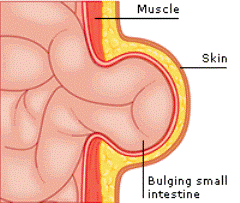A hernia simply means a protrusion of body tissue/organ (usually intestine) through a weakness or hole in other body tissue such as muscle. It most often refers to a part of the intestines protruding through the muscular wall of the abdomen (although other types of hernia are sometimes seen elsewhere in the body). The most common are inguinal and femoral hernias but especially in small children, umbilical hernias.
Symptoms Of Hernia
When a hernia first occurs you may have a feeling that something has given way and may experience a little pain. This soon wears off. Later, a lump appears. This doesn't hurt and may get bigger when you cough. It may intermittently disappear and reappear as the herniating tissue slips back into place and then protrudes again.
Although in most cases hernias just cause discomfort and are a bit of a nuisance, the real worry is that they'll strangulate. This means the tissue gets stuck through the weakness or hole, and its blood supply is cut off. Without an emergency operation to release it and restore its blood supply, some of the tissue will die leading to serious illness.
If you suspect you may have a hernia, you should get a doctor to confirm the diagnosis.
Causes And Risk Factors
The abdominal wall is a sheet of muscle that acts like a corset to stop the organs of the abdomen - principally, the intestines - from falling out. When a weakness or tear occurs in this muscle, part of the intestine bulges through and appears as a lump under the skin.
In the past, hernias were often called ruptures. They are most common in the groin (inguinal hernias). Men are particularly predisposed to inguinal hernias because of their anatomy - there is what amounts to a tunnel through the tissues of the groin which allowed the testes to descend from the abdomen into the scrotum during development. Intestinal tissue can also pass into this tunnel, forming a hernia.
Anything that raises the pressure within the abdomen, such as heavy lifting (for example, weights or building materials), coughing, even straining on the toilet, can cause a weakness or tear in the abdominal wall, or force intestinal contents out through a weakness. Vigorous exercise often results in hernias.
Sometimes the weakness is already present - for example, from birth around the umbilicus (umbilical hernia) in children or under the scar of an operation (incisional hernia).
Treatment And Recovery
In the past, trusses or supports were used to keep the hernia in place, but these days it's better to have a simple operation to repair the weakness before further problems arise.
Hernia operations are the most common operations performed on men in the UK. The NHS performs more than 100,000 hernia repairs every year. Most operations are done in under an hour and you can go home the same day.
A special mesh material is used for the repair and, depending on the local hospital arrangements and your own fitness, it may be done under local or general anaesthetic and sometimes by keyhole surgery.
With some advanced techniques you can be back to work in under a week, although this depends on your job and what the surgeon advises.
To prevent a hernia occuring, try to maintain your ideal weight and lift correctly, bending at the knees and keeping your back straight. Stopping smoking will help to prevent excessive coughing. Eating a good, high-fibre diet (with plenty of water) will help to avoid constipation and the need to strain on the toilet, which increases pressure inside the abdomen.















No comments:
Post a Comment